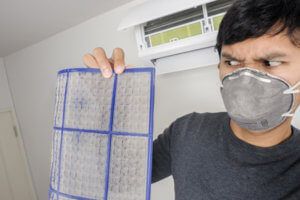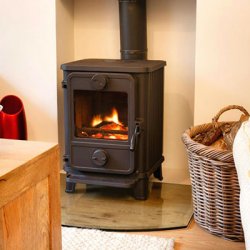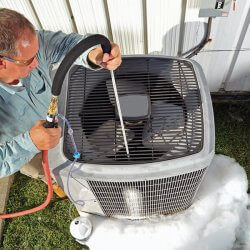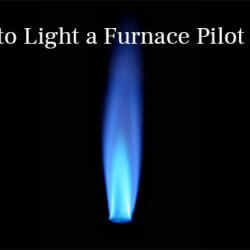We spend a major portion of our day indoors. It is often relieving to think that we are away from all the pollution outside and breathing the fresh, conditioned air inside our homes or offices. But is the air inside really that safe? Indoor air quality is an important metric that we often fail to measure. The air inside your home can be polluted too, and it can be as much a risk to your health as the air outside. Understanding this risk and how to improve your indoor air quality is crucial to protecting your family’s health.

Your HVAC system plays an important role in maintaining your indoor air quality. If you are looking for more information on how your HVAC unit can keep your home air clean and pure, call the heating and air conditioning experts at Galmiche & Sons at 314-993-1110.
Pollutants That Affect Your Indoor Air Quality
There are three main pollutants to be aware of when it comes to indoor air quality.
- Radon: A radioactive gas that usually seeps in through cracks in your basement or leaks in your floor, radon is a dangerous contaminant. It is hard to detect as it is colorless, odorless, and tasteless. Prolonged exposure to Radon can cause lung cancer. In fact, it is found to be the second most common cause of lung cancer after cigarette smoke.
- Carbon Monoxide: Another common pollutant in indoor air is carbon monoxide, which is usually formed when burning fuel. If you have a gas furnace, a wood-fired fireplace, or any other equipment that uses liquid/solid/gaseous fuel like oil, coal, etc., chances of carbon monoxide pollution in your home are greater unless you are careful. Carbon monoxide poisoning can also be fatal.
- Passive or Secondhand Cigarette Smoke: Cigarette smoke can be harmful not just for smokers but also for those who are exposed to secondhand smoke. Secondhand smoke from cigarettes can cause a number of respiratory diseases, including asthma, bronchitis, and pneumonia. It may even lead to lung cancer. So if there is anyone in your family who smokes, they may be polluting your indoor air for the entire household.
How to Improve Indoor Air Quality?

With a few simple measures in place, you can control and improve your indoor air quality. If you take these preventive and remedial measures, you can almost certainly ensure better health for your family.
- Test Indoor Air for Radon: Carry out an indoor air test for Radon. You can get a testing kit and do it yourself. But it is best to get the testing done by professionals to ensure correct results.
- Install a Carbon Monoxide Detector: A carbon monoxide detector fitted inside your home can tell you if the carbon monoxide levels in your indoor air have crossed threshold limits. Install a detector on every floor of your house and especially in all bedrooms. Place them away from flames and fires, as well as out of the way of the breeze. Proximity to these can give false readings. Also, replace the CO detector every seven years to ensure better protection.
- Carry out HVAC Maintenance Regularly: If you have a central HVAC system installed, all your indoor air is continuously circulating through it. So make sure that your HVAC system is maintained and cleaned every year. Clean or replace the air filters to prevent them from clogging and contaminating the air. Clean the ductwork and dehumidifier regularly. You should also maintain an optimum level of humidity inside the house, preferably around 30 to 50% in winter and about 60% in summer. This prevents the formation of fungi and mold inside your house and ensures overall good indoor air quality.
Hire a Reliable HVAC Contractor for Better Indoor Air Quality
An experienced HVAC contractor in St. Louis can help you test and improve your indoor air quality. With regular maintenance of your HVAC system, you can rest assured that your family is breathing in pure and clean air every day. Galmiche & Sons has been in the heating and air conditioner maintenance and repair business in St. Louis for more than 60 years, and we look forward to serving your family.
Get in touch with our heating and air conditioning (Link to contact page) experts to learn more about how we can help you.









